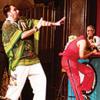
San Francisco’s fame as home to small, boldly experimenting theaters rises and ebbs over the decades, but the Bay Area has been and remains in the forefront of music and opera that’s avant-garde, out of the ordinary, rescued from unjust neglect, and the like. These are organizations investing effort and talent rather than money — money that often just isn’t there.
For low-budget, ambitious, daring, unusual, excellent opera, with affordable admission, consider — just off the top of my head — Opera Parallèle, West Edge, Livermore, Pocket Opera, Ars Minerva, Festival Opera, West Bay Opera, and more. And now, the youngest and smallest company, Island City Opera, enters the fray with a surprising Rimsky-Korsakov double-bill:
“There is a universe of outstanding opera beyond the most popular two dozen that you may know well,” says Island City’s righteous announcement of the Jan. 17–28 performances of Kashchey the Immortal and Mozart and Salieri in the Alameda Elks Lodge Ballroom.

Kashchey, well-known to Russian audiences, may be a premiere in this country, according to Lidiya Yankovskaya, visiting conductor for the double-bill. Yankovskaya, music director of the Chicago Opera Theater and artistic director of the Refugee Orchestra Project, told SFCV that she grew up “listening to and loving the piece, starting when I was still a child, and have been hoping to find an opportunity to perform it for some time.”
Based in San Francisco just for this season, Yankovskaya says she was thrilled by the invitation to conduct “this phenomenal work,” adding:
I believe strongly in bringing neglected gems from the Russian repertory to the U.S. and am very happy to bring my experience with Rimsky-Korsakov’s music and Russian repertory in general to the company. In my work with the company so far, I have been very impressed by the very high level of the singers and the strong organizational structure of the company, despite the small budget.

Legend has it that Rimsky-Korsakov wrote the story, based on the traditional Russian folktale, with help from his 14-year-old daughter. Igor Stravinsky and Michel Fokine used the same folktale as the basis for their ballet, The Firebird.
Kashchey is an evil wizard, and he imprisons Tsarevna Nenaglyadnaya Krasa, a princess who is longing for her beloved prince. Complications ensue until the wizard’s daughter Kashcheyevna cries and dies — to understand the story you must see the opera. (Sorry about the spoiler.)
Tenor Alex Boyer appears as Kashchey and soprano Rebecca Nathanson is making her company debut in the role of the Princess Tsarevna. Mezzos Silvie Jensen and Katja Heuzeroth share the role of Kashcheyevna, and bass Bojan Knezevic is the Storm Warrior. Lisa Bush-Finn and Sarah Sophia Pun are the dancers.
Mozart and Salieri, composed in 1898, was set to text by Alexander Pushkin, whose works also provided the basis for Aleko, Boris Godunov, Eugene Onegin, Mazeppa, The Queen of Spades, Rusalka, Ruslan and Lyudmila, and others.
As in the film Amadeus, Mozart and Salieri dramatizes the baseless rumor that Antonio Salieri (of La scuola de’ gelosi, Tarare, Les Danaïdes, and many other works) was so jealous of the younger and more talented Mozart that he poisoned and killed him. That makes for a good story, but it is quite without evidence of any kind. (The most recent research blames streptococcal infection leading to an acute nephritic syndrome for Mozart’s premature death at 35 in 1791.)
Mozart and Salieri will be performed in an original English translation by Yankovskaya and the director, Richard Bogart, with English supertitles.
Island City Opera describes the work:
The opera is particularly fascinating because while Pushkin clearly identified with the native and spontaneous genius of Mozart, Rimsky-Korsakov, ever studious, self-conscious, and ruthlessly critical of himself and others, must surely have felt some kinship with Salieri as well.
Indeed, while the music Rimsky-Korsakov supplied for Mozart to sing seems to roll easily and naturally off the singer’s tongue, that of Salieri is more challenging, harmonically correct, yet appearing somehow labored.
Baritone Anders Froehlich will sing the role of Salieri and tenor Darron Flagg will sing Mozart. Richard Bogart, who has sung in more than 80 productions with opera companies around the Bay Area, is stage director for both operas.





